- Home
- Douglas Niles
The Coral Kingdom Page 2
The Coral Kingdom Read online
Page 2
Robyn knew that the Moonshae Islands stood at a critical time in their long history. Only once before, under the reign of the hero Cymrych Hugh, had the four kingdoms of the Ffolk stood united under a single throne. Yet Cymrych Hugh had died with no clear heir to the throne, and within a generation, the isles had again broken into political fragments, easy prey for the northmen invaders who had gradually claimed much of the land.
Now Tristan Kendrick, the second High King to unite the Ffolk, had perished. He left a queen—a strong queen, Robyn reminded herself—and two daughters. Though the Ffolk, unlike the northmen, had never disparaged the rulership of a queen simply on the basis of her sex, Robyn knew that she would have to prove her fitness to continue the Kendrick line, and in that process, she must ensure that Alicia would inherit the kingdom upon her own death.
Her goal seemed clear, but there were so many obstacles, and as she thought of those obstacles, she came back to the plans that had caused her to pause, musing, at the window in the first place.
A harsh knock at the door, though not unexpected, broke Robyn’s reverie. “Come in,” she said.
The door opened to reveal Deirdre Kendrick. The princess’s black hair floated behind her, unbound and silky long, as she moved softly into her mother’s chamber. The two women looked remarkably similar, though the maturity and sorrow of age had unmistakably marked the mother with lines around her mouth and eyes and a fringe of gray that had begun to lighten her long black hair. “You wished to see me?” Deirdre said.
Robyn knew what she needed to say to her daughter, and she knew that Deirdre wouldn’t like it. She found it difficult to begin.
“Yes, my daughter. Please come here. I was enjoying the view.”
Silently the princess joined her mother.
“Summer,” observed the queen. “Such a vital, vibrant season. Doesn’t it make you feel alive?”
Deirdre smiled, but her eyes remained hooded. “Books make me feel alive, Mother—and they do so even in the dark of winter.”
Robyn suppressed a sigh, turning to face her daughter squarely. “I wish to speak with you about those books, about the forces you read about and touch. You bring a shadow around yourself. There is a darkness that surrounds you—a darkness you wear about your shoulders like a cloak. It disturbs me. You’ve opened the doors to places that can’t help but change you. The powers you touch are very dangerous things!”
“Of course they’re dangerous! But I know how to use them, and every day I learn more!” Deirdre’s reaction was anger, and her green eyes flashed with the heat of her emotion. “I follow a pathway to power without limit, without restriction—a road I’ve chosen for myself!”
“Without the limits, for example, imposed by a god—or goddess?” Robyn asked pointedly.
Deirdre shrugged. “You have your own life, Mother, and the goddess has chosen to favor that life. Once again you wear the mantle of the Great Druid, but that’s not the way for me!”
“Your sister shows a growing awareness of the Earthmother,” the queen said. “She wears the bracers of a druid, and soon she will bear the staff that I’m making for her. I should like to grant you an equal gift, my daughter—but I don’t know what it should be.”
“There is something that I desire very much,” Deirdre replied, her tone level, her eyes serious.
“If it falls within my power—”
“It is freedom, Mother—freedom from you, from the goddess! I have to be free to follow my own course, through the spellbooks and scrolls of wizardry. I need to see the hallowed places of magic in the Realms, visit the great sages, have the freedom to learn!”
Her impassioned voice rose as she spoke, and when she stopped suddenly, an almost unnatural silence settled over the room and the world outside, as if the birds and insects, even the wind, paused to see what happened next.
“No,” the queen said, quietly and firmly. “You’re one of two royal children. You must be prepared to rule should it be required of you. Your place is here, in Callidyrr—in the Moonshaes.”
“But there is so much more in the world!”
“Your father is dead!” snapped Robyn, and the bluntness of the painful admission was enough to quiet Deirdre for the moment. “The three of us—you, your sister, and I—hold the destiny of the Moonshaes in our hands. The great peace begun by King Tristan can flourish or fail. Do you believe for one moment that the Council of Lords will agree to the continuance of the Kendrick reign for old times’ sake?”
“Surely they won’t try to wrest the crown from you!” exclaimed the princess.
“Who knows what they’ll try?” Robyn sighed. “In three days, in Corwell, we shall see. I know we have allies—the good Earls of Fairheight and Corwell, to name two. And the Grand Mayor of the Halflings, Lord Pawldo, will certainly side with us. As to the others, who can say what schemes they’ve set in motion.”
“They wouldn’t dare!” There was no fear, just an icy fury, in the younger woman’s tone. The queen looked at her daughter sharply, never doubting the threat in her voice.
“If the three of us are united,” Robyn said quietly, “then I’m certain there is little that the lords can—or will—do. But if we go into the council squabbling and bickering, I don’t doubt that some challenge is inevitable.”
“I hear you, Mother,” said Deirdre softly.
“But do you understand me?” Robyn persisted. “Will you do as I ask?”
The princess stared at her mother, and Robyn saw anger flashing in those dark eyes. She barely heard the reply.
“I will.”
Neither woman averted her gaze for a moment, but finally Deirde looked away. “May I go now?” she asked angrily.
With a sigh that was more tired than angry, Robyn nodded, turning back to the window as her daughter left without another word. Once again she saw the sunlit landscape and the dazzling sea, and it was a scene that seemed to mock her. With conscious discipline, she forced her mind to turn back to her plans.
The funeral could not be a simple ceremony. It must be a festival worthy of the passing of a great High King. Yet neither would the normal rites suffice, for they had no body to bury.
Traditionally the great men and women of the Ffolk were put to rest in large barrows, mounds of earth raised over timber enclosures, where the corpse was laid together with an assortment of weapons, treasures, food, and drink—all that the deceased would need on his long journey into the afterlife.
For Tristan Kendrick, there would be no place in the barrows mound, no gifts for him to bear into the realms he now explored. Yet his queen would ensure that his passing was marked with proper ritual and ceremony. This goal had given her strength during the past weeks, and now that the event drew near, it provided a focus for her mind when it would have been so easy to collapse into grief.
Corwell! She knew instinctively that she had made the right choice in the location for the ritual of the king’s passage. That pastoral kingdom, childhood home to both Tristan and Robyn, was a place where she could get away from the chaos of the high court, returning like a wounded animal to the den from which she had emerged as a cub.
Corwell was the ancestral home of the Kendricks, and both the queen and her daughters bore that name. The ancient castle—protected still by a palisade of wooden timbers, though the king had ordered a stone wall started some years back—would reinforce in the minds of the lords and kings of the Ffolk that Robyn came by her rank honestly. And that her daughters, too, bore the blood of the island’s royal line.
And there was more than political truth to her choice, just as Robyn was more than a queen to the Ffolk. The kingdom of Corwell was on the isle of Gwynneth, and there Robyn would find Myrloch Vale, the heart of the reawakening power of the goddess Earthmother.
Robyn Kendrick had once been the great druid of the isles. With the passing of her goddess, the order of druids had drifted into the wilds of the Moonshaes, their numbers shrinking, their powers gone. But now, thanks primarily to the a
ctions of the two Kendrick daughters, the goddess had surged back to life, her druids reborn.
Robyn herself was no longer a young woman. A return to the isolation of a druid’s grove seemed like a strange form of exile now, something she did not desire, nor would have accepted. Yet she had seen the awakening of similar powers within Alicia—powers that Alicia denied, preferring to believe that she would become a warrior queen. Yet now the older princess wore silver bracers on her wrists, the coiled bracelets in the shape of dragons that identified her as a chosen daughter of the goddess.
“Carry me a little longer, Mother … please.”
Robyn whispered the words like a prayer and felt a lightening of her oppression. She did not feel joy—there were times she believed that happiness was a thing from her distant past—but she could steel herself to her work.
Finally Robyn stepped to the window. The city and the harbor seemed to pause, frozen in tableau. The queen leaned outward, spreading her arms wide, and they became her wings. The human woman fell from the window, but an eagle of purest white flew away from the the castle, away from the town—away from all of Callidyrr.
In two days, that eagle would reach Corwell.
* * * * *
Brigit Cu’Lyrran hauled back on the reins of her white mare. Talloth reared silently, raising her rider so that the elfwoman could see over the screen of quivering aspen branches before her. Her keen eyes had detected a flash of movement up the valley several minutes before, in the direction of the Fey-Alamtine.
She had been right—the Synnorian Gate would open today! Quickly she nudged Talloth with her knees, and the fleet mare exploded into a gallop, carrying her mistress swiftly up the trail. Passing a steep upward branch to the left, a rarely used trail that led to the human kingdom of Corwell, she continued up the main path.
In a few minutes, Talloth slowed to a lope, and then a trot as the trail opened into a clearing. The mare instinctively paused before the Fey-Alamtine, the Synnorian Gate.
A wall of obsidian-black cliff shimmered before Brigit, as if an invisible sheen of water flowed across the surface, but Brigit knew that the rock was dry. The visual effect had a magical cause.
Three or four times in her life the gate had been used, and once before she had been here to witness. Those memories, from a hundred years ago, remained with her as vividly as this morning’s. But today she was the only one here, and as the shimmering grew more pronounced, she knew that the gate would open soon.
As captain of the Sisters of Synnoria, Brigit spent much of her time riding the swales and valleys of this tiny elven realm in the Moonshae Islands. Synnoria, and its beautiful capital Chrysalis, bordered the Ffolk kingdom of Corwell, yet the Llewyrr had existed without human intrusion for more than ten centuries. Magical wards and rugged mountains surrounded Synnoria on all sides; indeed, many of the Ffolk believed that the Llewyrr were creatures of history or legend.
Brigit was one of the few Llewyrr to have journeyed beyond the borders of Synnoria. Twenty years earlier, she and a small company of her knights had aided the human king, Tristan Kendrick, in the Darkwalker War. Now she would happily spend the rest of her days riding these valleys and woodlands.
A burst of light washed over her like a cool dawn, and her attention riveted to the Fey-Alamtine. The glossy black wall slowly grew opaque, taking on a rosy hue and an appearance of great depth, as if she looked through a foggy window at a scene many miles away. The shimmering stopped suddenly, replaced by a fixed glow.
Brigit saw a male elf, clad in a dirty, torn cotton tunic, step through the wall, as if he emerged from the heart of the mountain, though she knew that he must have come from far beyond. He blinked in the bright daylight of Synnoria and then gasped when he saw Brigit. He was unarmed, but he clutched a triangle of silvery metal in both of his hands.
“Get out of the way,” Brigit suggested gently. “The gate will not remain open indefinitely.”
Blinking in surprise, the male quickly nodded and took several steps forward. A female elf, equally dirty and ragged, followed him, clutching a youngster by the hand. The elven child ran forward to clasp the leg of the male who had been the first to emerge.
They came through the shimmering wall in single file, and the elven horsewoman got a good look at them as they emerged into Synnoria: all of them ragged, unkempt, and dirty. Their blond hair was disheveled, trailing back in the wind and plainly revealing the pointed ears of Brigit’s elven kindred. She felt no alarm now, only sympathy and a kind of general sadness at the course of advancing history.
The sister knight dismounted, leaving Talloth to wait patiently for her mistress. Brigit advanced slowly toward the leader, whom she marked as a cleric by the golden oak leaf—symbol of Corellon, god of all the elves—embroidered on his sleeves.
The young priest stared at her in mute suspicion—or hope. Brigit held up a hand and advanced at a walk. “Welcome to Synnoria,” she said in the language of the elves. “I see that you have traveled the ways of the Fey-Alamtine.”
“Yes—in desperate haste,” replied the priest, stepping forward. He held his hand on the shoulder of the elven boy who had run to him moments before. The youngster looked up at Brigit with palpable hostility, his hand rested on the hilt of a tiny dagger—a kitchen tool, probably—that he wore in his belt. More and more ragged elves came through, until well over a hundred had assembled in the clearing before the dark cliff.
“We are the Thy-Tach,” continued the cleric. Brigit saw that he held the Alamtine Triangle in his hand. She had seen one example of the rare artifact before, the last time a tribe had come through the gate. “Our village was attacked by some monstrous horror, a three-legged creature as big as a hill. We had no recourse but flight!”
“Easy—you’re safe now,” the knight said, reaching out a hand to clasp the priest on the shoulder. Her touch seemed to steady him.
“My name is Pallarynd,” said the priest quietly. “I thank you for your kind welcome.”
“I’ve seen tribes come through the gate of the Fey-Alamtine before in my lifetime, and the shock of the transition is always upsetting. That’s why you’ll need to rest here for some time before you continue on,” Brigit explained.
“It really worked, didn’t it?” asked Pallarynd, his tone amazed, looking back at the Fey-Alamtine. The magical gate again looked like a shimmering wall of wet obsidian. “Torcelly had kept this ancient triangle for centuries. She’d never tell me what it was for, but she said that we might need it sometime. Now it has brought the village here, most of us alive.”
“It’s the way we ensure the survival of our race,” Brigit replied. “Only on Evermeet can the elves reign over all the land. Everywhere else the humans press, or, even worse, other creatures. It is the Fey-Alamtine that gives hope to those elves such as yourselves, too isolated or too threatened to flee on foot.”
“We’re halfway there now, aren’t we?” mused Pallarynd, to himself as much as the knight.
“Yes,” Brigit said, with a soft smile at the young elf beside the priest. The little fellow squinted, still suspicious, but at least his hand fell away from the knife. The cleric squeezed his shoulder and the boy took the older elf’s hand.
Pallarynd turned to his people. The Thy-Tach pressed close to hear his words. “To think we have come safely to Synnoria, the outpost of our people on the Moonshae Islands! The Fey-Alamtine has led us here, and when it is time, it shall lead us on the final leg of our migration as we travel to the eternal elvenhome, Evermeet!”
The Thy-Tach elves, in their ragged leggings and woods-brown tunics, whispered quietly among themselves. Their losses were too recent, and too horrifying, for the elves to feel any joy. Yet as the sister knight turned back down the valley, their relief was palpable to Brigit. She urged Talloth into a fleet canter. The Thy-Tach would find shelters, beds, and food awaiting them when they reached Chrysalis.
* * * * *
The keen bow of the Coho sliced the smooth waters of Corwell Firth. U
nder the steady eye of her captain, Brandon of Gnarhelm, the small longship glided toward the narrow harbor mouth a mile or two away. Soon they passed the breakwater, gliding toward the dock at the conclusion of a smooth five-day journey from Callidyrr.
Two women stood in the bow of the ship. One of them was heavyset, with a smile as broad as the sun and a merry twinkle in her eyes, seemingly amused by everything they saw. The woman’s hair was gray, tied in a bun behind her neck, and the wrinkles lining her face gave a grandmotherly cast to her age, but she stood at the gunwale with one foot balanced on the rail, as light on her feet as any young sailor. Around her shoulders was strapped a dark-grained harp, silver strings winking in the sunlight, and a smooth, well-polished body shimmering from the reflections of the waves.
The second woman was much younger, and strikingly beautiful. Her fair hair, like straw tinted with copper, trailed behind her in the wind, but though her lips creased into a smile at the sight of her family home, her good humor did not extend to her eyes. She looked up at the castle, rising above the town and the firth on its rocky knoll, and she missed her father more than ever.
“Look—there’s Lord Pawldo!” announced Tavish, the bard.
The diminutive figure of the halfling, clad in an elegant blue waistcoat and shiny, high-topped black boots, waved enthusiastically from the wharf. As the skilled northmen crew, with a few strokes of the oars, brought the vessel bumping gently against the dock, the Lord Mayor Pawldo of Lowhill, longtime friend of the Kendrick family, rushed up to the princess and embraced her. Alicia bravely tried not to cry, but this was the first time she had seen her old friend since her father’s death. She couldn’t bear the embrace of the halfling, such a great companion of her father’s, without shedding tears of grief.
“There, there, child,” whispered Pawldo, and for a brief moment, Alicia felt like a little girl. The strength of his shoulder to cry on was a great relief.

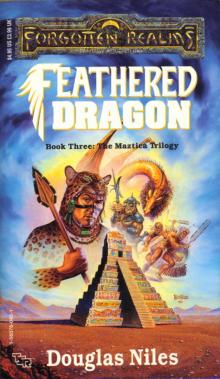 Feathered Dragon mt-3
Feathered Dragon mt-3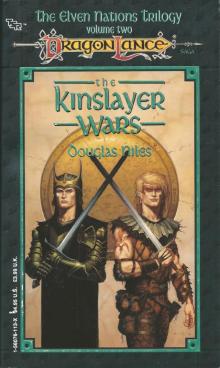 The Kinslayer Wars
The Kinslayer Wars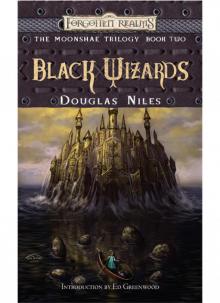 Black Wizards
Black Wizards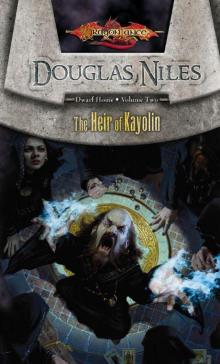 The Heir of Kayolin dh-2
The Heir of Kayolin dh-2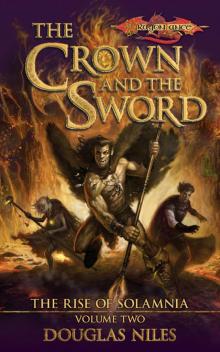 The Crown and the Sword tros-2
The Crown and the Sword tros-2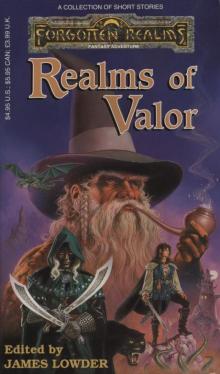 Realms of Valor a-1
Realms of Valor a-1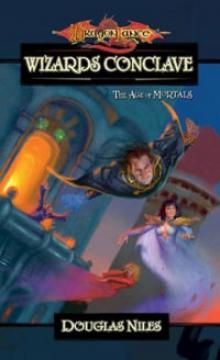 Wizards Conclave aom-5
Wizards Conclave aom-5 Fox On The Rhine
Fox On The Rhine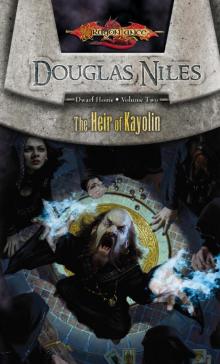 The Heir of Kayolin
The Heir of Kayolin Fox at the Front (Fox on the Rhine)
Fox at the Front (Fox on the Rhine)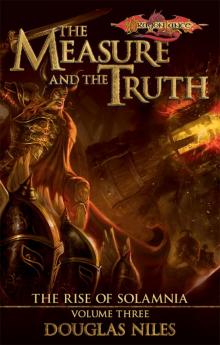 Measure and the Truth tros-3
Measure and the Truth tros-3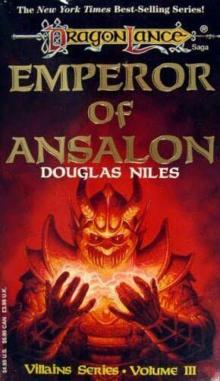 Emperor of Ansalon (d-3)
Emperor of Ansalon (d-3)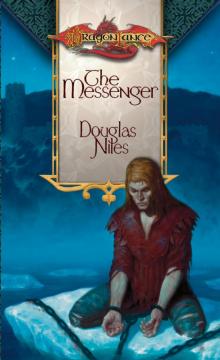 The Messenger it-1
The Messenger it-1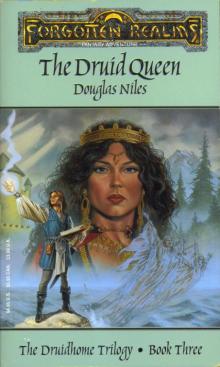 The Druid Queen tdt-3
The Druid Queen tdt-3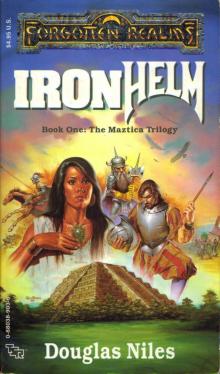 Ironhelm mt-1
Ironhelm mt-1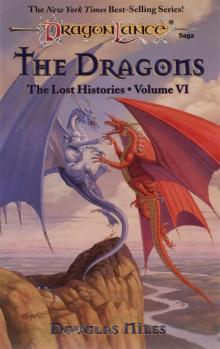 The Dragons lh-6
The Dragons lh-6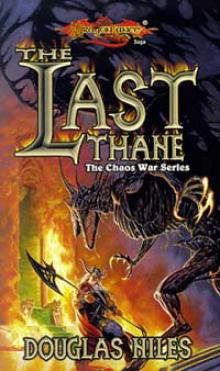 The Last Thane cw-1
The Last Thane cw-1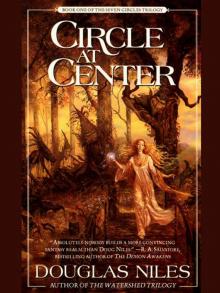 Circle at center sc-1
Circle at center sc-1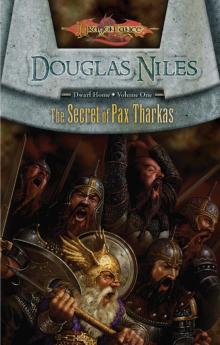 Secret of Pax Tharkas dh-1
Secret of Pax Tharkas dh-1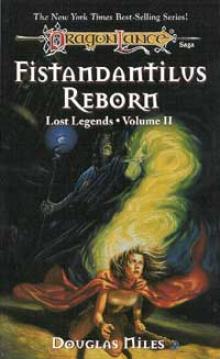 Fistanadantilus Reborn ll-2
Fistanadantilus Reborn ll-2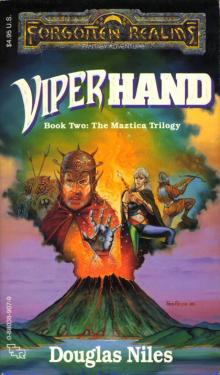 Viperhand mt-2
Viperhand mt-2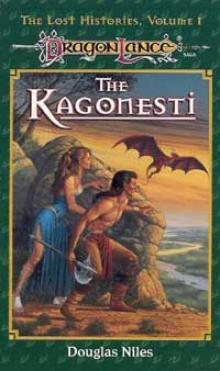 Kagonesti lh-1
Kagonesti lh-1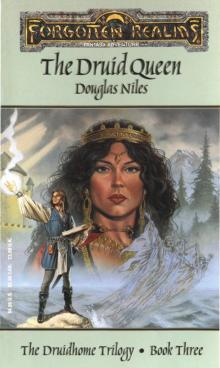 The Druid Queen
The Druid Queen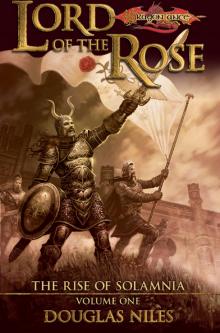 Lord of the Rose tros-1
Lord of the Rose tros-1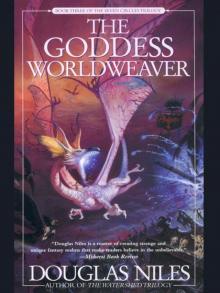 Goddess Worldweaver sc-3
Goddess Worldweaver sc-3 Eyeball to Eyeball (Final Failure)
Eyeball to Eyeball (Final Failure)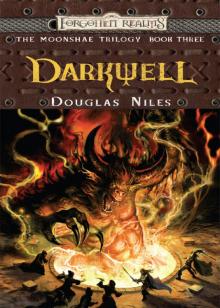 Darkwell
Darkwell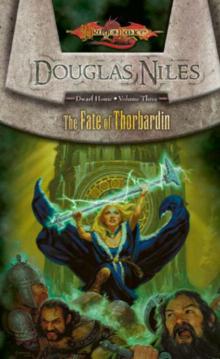 Fate of Thorbardin dh-3
Fate of Thorbardin dh-3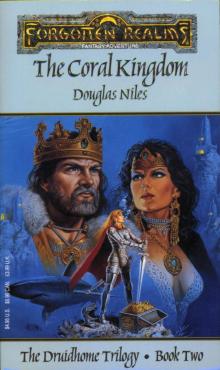 The Coral Kingdom tdt-2
The Coral Kingdom tdt-2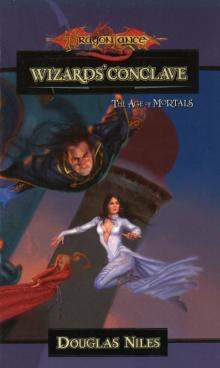 Wizard's Conclave
Wizard's Conclave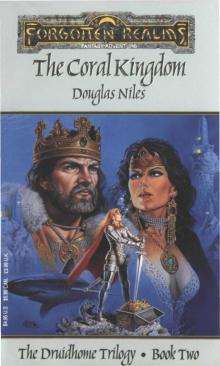 The Coral Kingdom
The Coral Kingdom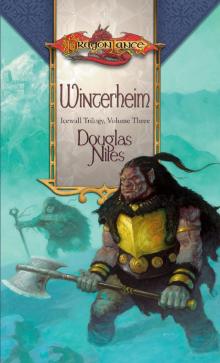 Winterheim it-3
Winterheim it-3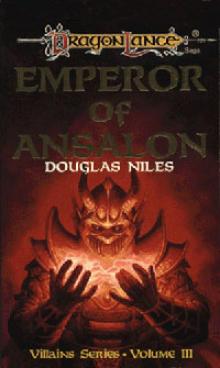 Emperor of Ansalon v-3
Emperor of Ansalon v-3 MacArthur's War: A Novel of the Invasion of Japan
MacArthur's War: A Novel of the Invasion of Japan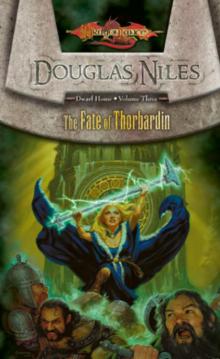 The Fate of Thorbardin
The Fate of Thorbardin The Rod of Seven Parts
The Rod of Seven Parts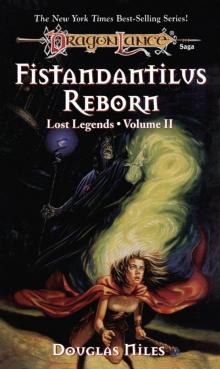 Fistandantilus Reborn
Fistandantilus Reborn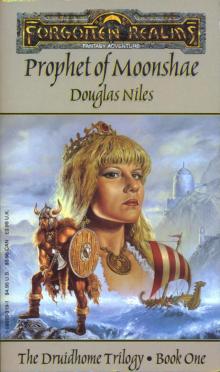 Prophet of Moonshae tdt-1
Prophet of Moonshae tdt-1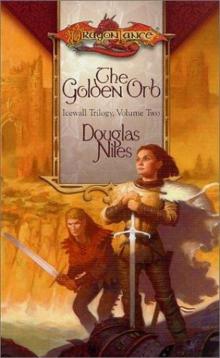 The Golden Orb i-2
The Golden Orb i-2